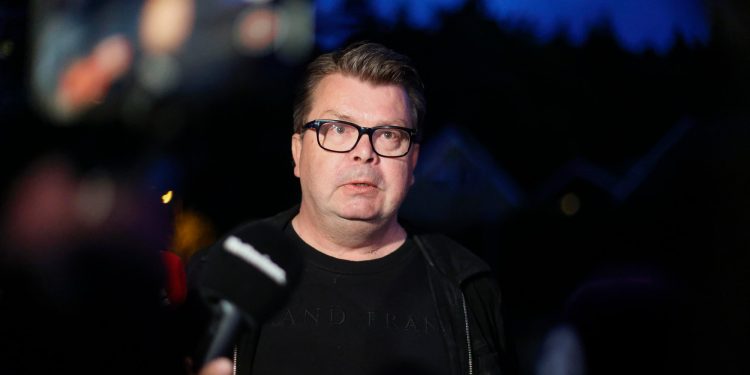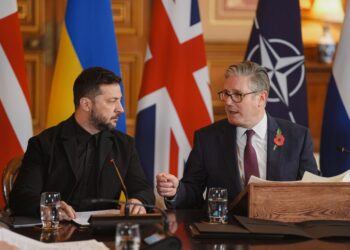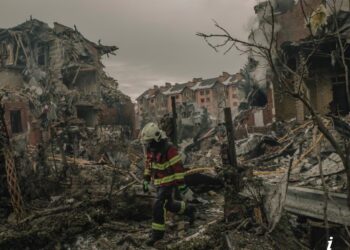“After conducting extensive research, I have built a follower base, including many Georgians, who turn to my X feed for information about Georgia,” – Terje Helland, External Advisor at the European Neighborhood Council in Brussels, tells Radio Free Europe/RL’s Georgian Service. Helland has become one of the most popular and trusted sources on X when it comes to reporting the Georgian news to the wider Western audience. “My motivation for engaging was the belief that the West needed to understand the consequences of inaction: what happened in Ukraine could easily repeat itself in Georgia,” he says.
What’s at stake right now for Georgia? What’s being decided?
It all boils down to a matter of autocracy versus democracy. It’s about whether Georgia can still be considered a democracy. From a broader perspective, Georgia has clearly abandoned the Euro-Atlantic path it has followed for decades. The Georgian Dream has now essentially declared they are no longer pursuing that route, and this has led to widespread protests, with people taking to the streets in massive numbers.
On that pivotal statement, why do you think they said what they said? And why now?
I think it was a bit of an unforced error. There was an emotional reaction when the European Parliament, with a significant majority, declared the government illegitimate and called for new elections. It seems to me that the Prime Minister’s response was an instinctive reaction to hit back at the European Parliament. It’s not the first time the Georgian Dream has reacted in this way—remember when they decided not to invite diplomats to the government’s opening ceremony after the diplomatic corps decided to skip it?
You wrote the “unplanned, almost childish statement about not pursuing EU membership may finally cost Georgian Dream their grip on power.” Does Irakli Kobakhidze strike you as someone prone to such unplanned statements, or do you think every move is greenlit by Bidzina Ivanishvili?
That’s a very good point. At the very least, I can say that if they indeed planned it, the timing was absolutely disastrous, and they grossly underestimated the reaction it would provoke. At a time when they are desperately trying to legitimize the elections and their new parliament, making a statement about abandoning the EU path couldn’t have come at a worse moment. If that was indeed planned, it’s an incredibly high-risk gamble. Now, they’ve handed the opposition momentum and further alienated the international community, which is horrified by how security forces are brutalizing their own citizens. It’s incredibly revealing just how desperate Georgian Dream and Ivanishvili must be. Even after people are detained by the police, they are beaten severely and systematically. This goes beyond just violence—it’s torture. And when you look at the police, who are faceless, anonymous figures hiding behind masks, it’s not just cowardice—it’s the face of oppression, the face of dictatorship. This police impunity, concealed behind masks, I fear, will only end in tragedy.
So, if we’re talking hypotheticals, do we have two options here? Either Ivanishvili made a huge misstep, or Kobakhidze, loyal as he is to his patron, acted on his own and crossed a line?
I think Ivanishvili and Kobakhidze have likely discussed this before, but once again, the timing was awful.
You also mentioned the return of the Foreign Agents bill earlier this year. Could there be a deeper motive behind this, like Ivanishvili’s using the bill to undermine the people’s energy to protest the election results?
My theory is that Georgian Dream has essentially been a Trojan horse, working to steer Georgia away from the Western path, which the majority of Georgians support. Ivanishvili has tried to ride two horses, claiming to support EU integration while simultaneously working against it. When the EU announced it would open accession talks in December 2023, Georgian Dream panicked, fearing that they would lose control. That’s when they revived the Foreign Agents bill and pushed through anti-LGBT laws—to make EU integration with Georgia impossible.
Looking at Putin’s recent comments on Georgia, where he expressed approval but stressed that “we don’t touch it,” what’s your reading of that?
As long as Georgian Dream and Ivanishvili are in charge, Putin doesn’t need to interfere. He has influence over the process through them. Georgian Dream has orchestrated a de facto takeover of state institutions: the government, the judiciary, the security service, and other key regulatory bodies. It’s an autocracy now. The only independent institution left is the presidency, but when it is replaced by this football player at the end of the month, the takeover will be complete. I’m convinced that Putin has full control over Ivanishvili, financially and probably through kompromat. The Kremlin is aware of the strong anti-Russian sentiment among Georgians, so they tread carefully, trying not to provoke the population. They prefer to keep their distance and let Georgians deal with it themselves.
What do you expect from the West in response to these developments?
The West, particularly the EU, is standing by, ready to help if Georgia chooses the right path—one that doesn’t involve Georgian Dream. The West needs to focus on three things now. First, they should not legitimize any part of the current government, whether it’s the parliament, the government, or the elections. Second, they need to impose effective sanctions on the Georgian Dream and those surrounding Ivanishvili who are responsible for the current situation. Third, the West should demand new elections under international supervision to decide Georgia’s future.
On the strategic partnership with the US, Georgian Dream doesn’t seem deterred. The PM said they’re banking on the upcoming Trump administration. Is there any chance Ivanishvili could cut a deal with Trump, given his reputation as a savvy dealmaker?
There’s strong bipartisan support for Georgia in the US, especially for its Euro-Atlantic aspirations. I’m not concerned that Georgia will lose US support due to the new administration. If Georgia loses that support, it will be because of Georgian Dream, not the new administration. The policy towards Georgia will continue to be driven by Georgia’s friends in the US.
If the current standoff continues and neither side budges, how long can this go on for?
If the population loses this battle, it could drag on for years. That’s why it’s so critical for the West to remain firm and for the Georgian people to stay vigilant and committed to this fight. It’s a battle that needs to be fought to the very end.
Interview by Vazha Tavberidze














